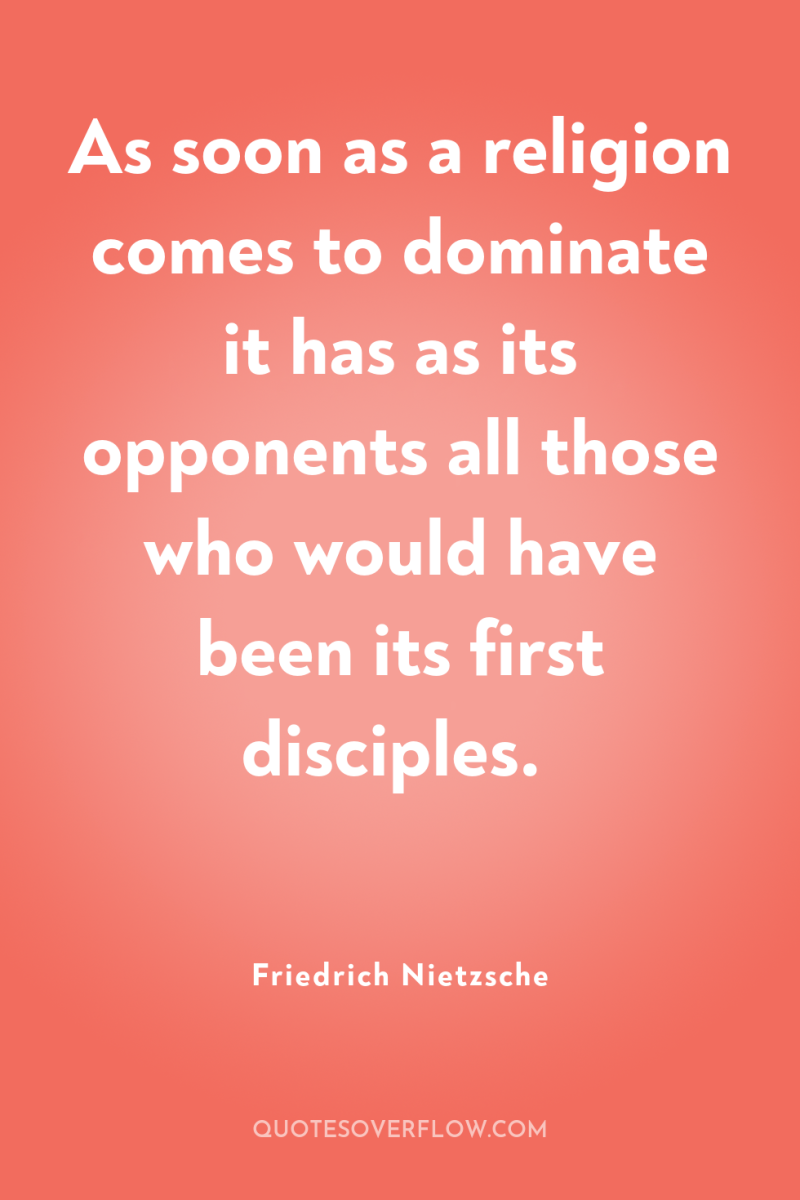
1
As soon as a religion comes to dominate it has as its opponents all those who would have been its first disciples.Friedrich Nietzsche

2
The more thoroughly a person understands life, the less he will mock, though in the end he might still mock the "thoroughness of his understanding.Friedrich Nietzsche

3
No one dies of fatal truths nowadays: there are too many antidotes.Friedrich Nietzsche

4
One thing a man must have: either a naturally light disposition or a disposition lightened by art and knowledge.Friedrich Nietzsche
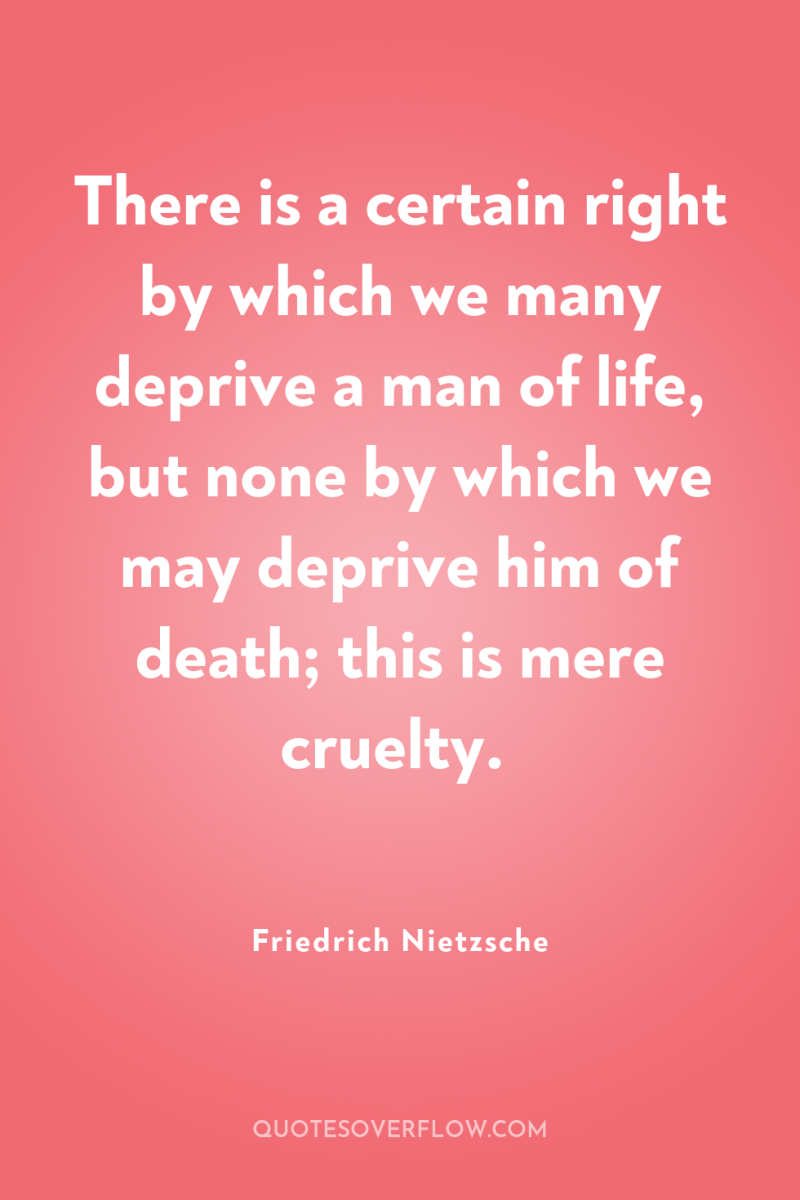
5
There is a certain right by which we many deprive a man of life, but none by which we may deprive him of death; this is mere cruelty.Friedrich Nietzsche
6
Just as in the second part of a verse bad poets seek a thought to fit their rhyme, so in the second half of their lives people tend to become more anxious about finding actions, positions, relationships that fit those of their earlier lives, so that everything harmonizes quite well on the surface: but their lives are no longer ruled by a strong thought, and instead, in its place, comes the intention of finding a rhyme.Friedrich Nietzsche
7
Against the censurers of brevity. - Something said briefly can be the fruit of much long thought: but the reader who is a novice in this field, and has as yet reflected on it not at all, sees in everything said briefly something embryonic, not without censuring the author for having served him up such immature and unripened fare.Friedrich Nietzsche
8
Twofold misjudgement. - The misfortune suffered by clear-minded and easily understood writers is that they are taken for shallow and thus little effort is expended on reading them: and the good fortune that attends the obscure is that the reader toils at them and ascribes to them the pleasure he has in fact gained from his own zeal.Friedrich Nietzsche
9
The recipe for becoming a good novelist, for example is easy to give but to carry it out presupposes qualities one is accustomed to overlook when one says 'I do not have enough talent'. One has only to make a hundred or so sketches for novels, none longer than two pages but of such distinctness that every word in them is necessary; one should write down anecdotes each day until one has learned how to give them the most pregnant and effective form; one should be tireless in collecting and describing human types and characters; one should above all relate things to others and listen to others relate, keeping one's eyes and ears open for the effect produced on those present, one should travel like a landscape painter or costume designer; one should excerpt for oneself out of the individual sciences everything that will produce an artistic effect when it is well described, one should, finally, reflect on the motives of human actions, disdain no signpost to instruction about them and be a collector of these things by day and night. One should continue in this many-sided exercise some ten years: what is then created in the workÂshop, however, will be fit to go out into the world. - What, however, do most people do? They begin, not with the parts, but with the whole. PerÂhaps they chance to strike a right note, excite attention and from then on strike worse and worse notes, for good, natural reasons.Friedrich Nietzsche

10
There is not enough love and goodness in the world to permit giving any of it away to imaginary beings.Friedrich Nietzsche
11
A degree of culture, and assuredly a very high one, is attained when man rises above superstitions and religious notions and fears, and, for instance, no longer believes in guardian angels or in original sin, and has also ceased to talk of the salvation of his soul.Friedrich Nietzsche

12
In large States public education will always be extremely mediocre, for the same reason that in large kitchens the cooking is at best only mediocre.Friedrich Nietzsche
13
Marriage as a long conversation. - When marrying you should ask yourself this question: do you believe you are going to enjoy talking with this woman into your old age? Everything else in a marriage is transitory, but most of the time that you're together will be devoted to conversation.Friedrich Nietzsche
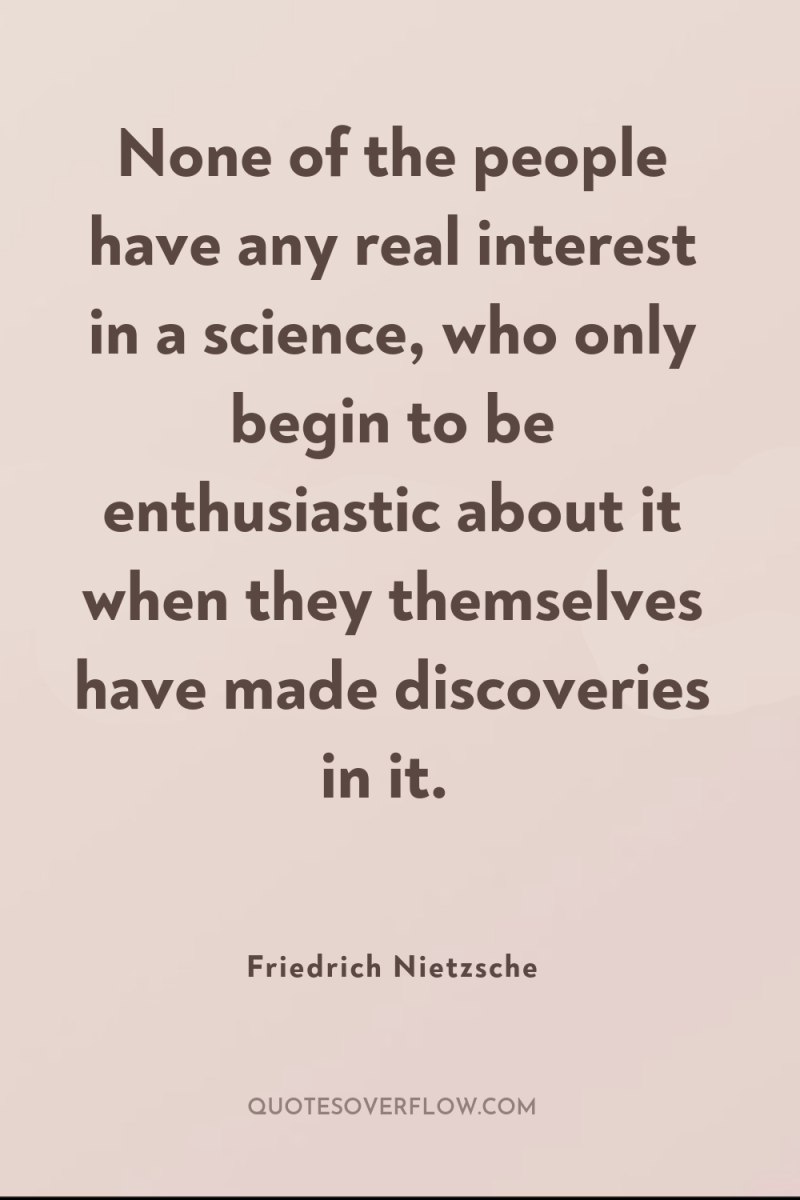
14
None of the people have any real interest in a science, who only begin to be enthusiastic about it when they themselves have made discoveries in it.Friedrich Nietzsche
15
Language as putative science. - The significance of language for the evolution of culture lies in this, that mankind set up in language a separate world beside the other world, a place it took to be so firmly set that, standing upon it, it could lift the rest of the world off its hinges and make itself master of it. To the extent that man has for long ages believed in the concepts and names of things as in aeternae veritates he has appropriated to himself that pride by which he raised himself above the animal: he really thought that in language he possessed knowledge of the world. The sculptor of language was not so modest as to believe that he was only giving things designations, he conceived rather that with words he was expressing supreame knowledge of things; language is, in fact, the first stage of occupation with science. Here, too, it is the belief that the truth has been found out of which the mightiest sources of energy have flowed. A great deal later - only now - it dawns on men that in their belief in language they have propagated a tremendous error. Happily, it is too late for the evolution of reason, which depends on this belief, to be put back. - Logic too depends on presuppositions with which nothing in the real world corresponds, for example on the presupposition that there are identical things, that the same thing is identical at different points of time: but this science came into existence through the opposite belief (that such conditions do obtain in the real world). It is the same with mathematics, which would certainly not have come into existence if one had known from the beginning that there was in nature no exactly straight line, no real circle, no absolute magnitude.Friedrich Nietzsche

16
All good things are powerful stimulants to life, even a good book written against life.Friedrich Nietzsche
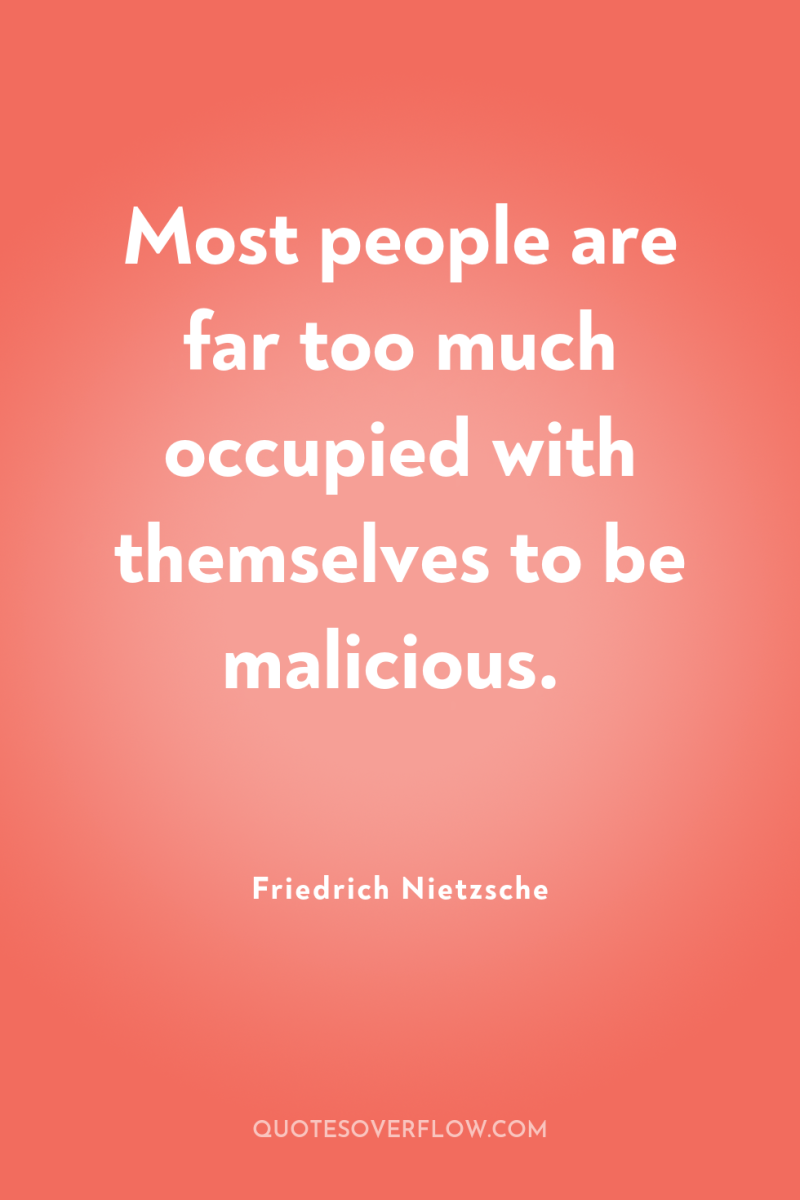
17
Most people are far too much occupied with themselves to be malicious.Friedrich Nietzsche
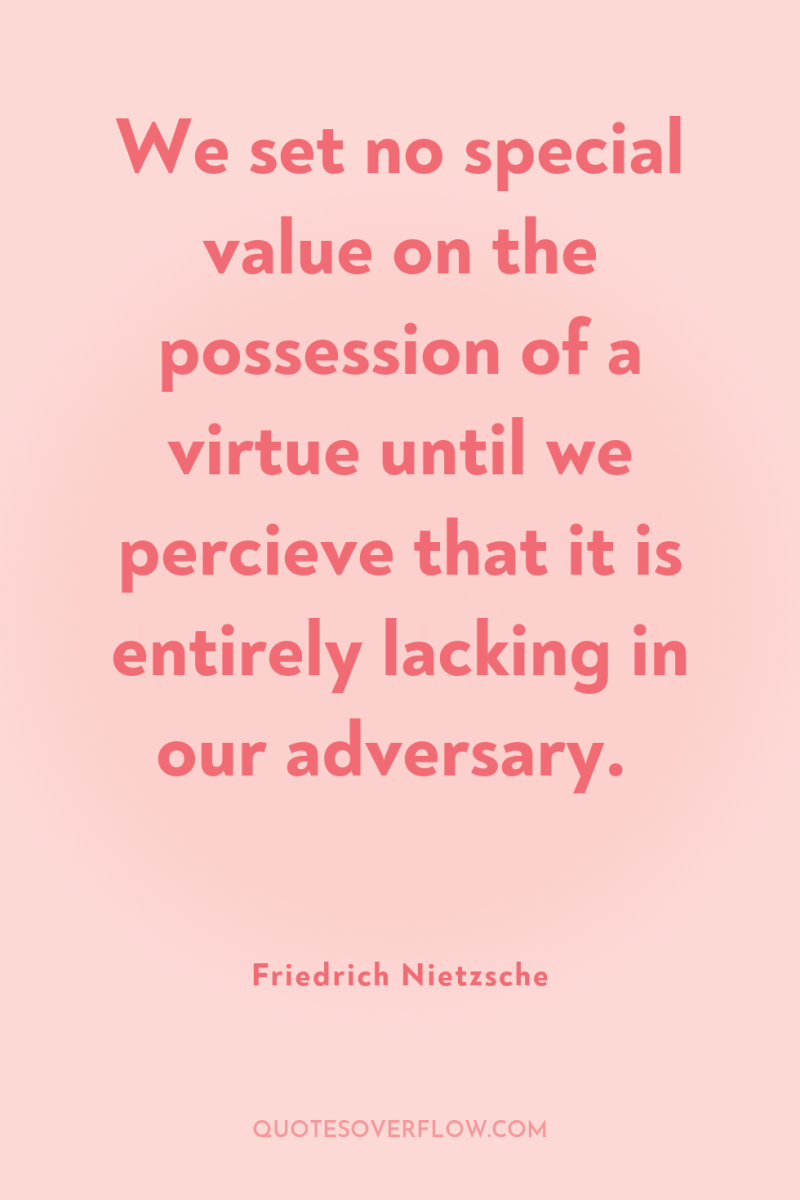
18
We set no special value on the possession of a virtue until we percieve that it is entirely lacking in our adversary.Friedrich Nietzsche
19
Love's cruel notion. - Every great love brings with it the cruel idea of killingthe object of that love, so that he may be removed once and for all fromthe wicked game of change: for love dreads change more than it doesdestruction.Friedrich Nietzsche
20
The eternal child. - We think that play and fairy tales belong to childhood:how shortsighted that is! As though we would want at any time of life tolive without play and fairy tales! We give these things other names, to besure, and feel differently about them, but precisely this is the evidencethat they are the same things - for the child too regards play as his workand fairy tales as his truth. The brevity of life ought to preserve us from apedantic division of life into different stages - as though each broughtsomething new - and a poet ought for once to present a man of twohundred: one, that is, who really does live without play and fairy tales.Friedrich Nietzsche
21
At a certain place in Beethoven's Ninth Symphony, for example, he might feel that he is floating above the earth in a starry dome, with the dream of immortality in his heart; all the stars seem to glimmer around him, and the earth seems to sink ever deeper downwards.Friedrich Nietzsche
22
Our crime against criminals lies in the fact that we treat them like rascals.Friedrich Nietzsche
23
He who cannot put his thoughts on ice should not enter into the heat of dispute.Friedrich Nietzsche
24
Masks. - There are women who, however you may search them, prove to have no content but are purely masks. The man who associates with such almost spectral, necessarily unsatisfied beings is to be commiserated with, yet it is precisely they who are able to arouse the desire of the man most strongly: he seeks for her soul - and goes on seeking.Friedrich Nietzsche
25
A man far oftener appears to have a decided character from persistently following his temperament than from persistently following his principles.Friedrich Nietzsche
26
The solitary speaks." One receives as a reward for much ennui , ill-humour and boredom, such as a solitude without friends, books, duties or passions must entail, one harvests those quarters of an hour of the deepest immersion in oneself and nature. He who completely entrenches himself against boredom also entrenches himself against himself: he will never get to drink the most potent refreshing draught from the deepest well of his own being.Friedrich Nietzsche
27
The strongest intimidation, by the way, is the invention of a hereafter with a hell everlasting.Friedrich Nietzsche
28
Error regarding life necessary to life. - Every belief in the value and dignity of life rests on false thinking; it is possible only through the fact that empathy with the universal life and suffering of mankind is very feebly developed in the individual. Even those rarer men who think beyond themselves at all have an eye, not for this universal life, but for fenced-off portions of it. If one knows how to keep the exceptions principally in view, I mean the greatly gifted and pure of soul, takes their production for the goal of world-evolution and rejoices in the effects they in turn produce, one may believe in the value of life, because the one is overlooking all other men: thinking falsely, that is to say. And likewise if, though one does keep in view all mankind, one accords validity only to one species of drives, the less egoistical, and justifies them in face of all the others, then again one can hope for something of mankind as a whole and to this extent believe in the value of life: thus, in this case too, through falsity of thinking. Whichever of these attitudes one adopts, however, one is by adopting in an exception among men. The great majority endure life without complaining overmuch; they believe in the value of existence, but they do so precisely because each of them exists for himself alone, refusing to step out of himself as those exceptions do: everything outside themselves they notice not at all or at most as a dim shadow. Thus for the ordinary, everyday man the value of life rests solely on the fact that regards himself more highly than he does the world. The great lack of imagination from which he suffers means he is unable to feel his way into other beings and thus he participates as little as possible in their fortunes and sufferings. He, on the other hand, who really could participate in them would have to despair of the value of life; if he succeeded in encompassing and feeling within himself the total consciousness of mankind he would collapse with a curse on existence - for mankind has as a whole no goal, and the individual man when he regards its total course cannot derive from it any support or comfort, but must be reduced to despair. If in all he does he has before him the ultimate goallessness of man, his actions acquire in his own eyes the character of useless squandering. But to feel thus squandered, not merely as an individual fruits but as humanity as a whole, in the way we behold the individual fruits of nature squandered, is a feeling beyond all other feelings. - But who is capable of such a feeling? Certainly only a poet: and poets always know how to console themselves. .Friedrich Nietzsche
29
When virtue has slept, it will arise again all the fresher.Friedrich Nietzsche
30
..we are concluding falsely that we can deduce the justification, the rational admissibility of displeasure, from the fact that it exists; and from this false deduction Schopenhauer arrives at his fantastic conclusion of so-called intelligible freedom. But displeasure after the deed need not be rational at all: in fact, it certainly is not rational, for it rests on the erroneous assumption that the deed did not have to follow necessarily. Thus, because he thinks he is free (but not because he is free), man feels remorse and the pangs of conscience. Furthermore, this displeasure is a habit that can be given up; many men do not feel it at all, even after the same actions that cause many other men to feel it. Tied to the development of custom and culture, it is a very changeable thing, and present perhaps only within a relatively short period of world history. No one is responsible for his deeds, no one for his nature; to judge is to be unjust. This is also true when the individual judges himself. The tenet is as bright as sunlight, and yet everyone prefers to walk back into the shadow and untruth - for fear of the consequences.Friedrich Nietzsche
31
The wittiest authors raise the very slightest of smiles.Friedrich Nietzsche
32
Of the spirit of women. - The spiritual power of a woman is best demonstrated by her sacrificing her own spirit to that of a man out of love of him and of his spirit but then, despite this sacrifice, immediately evolving _a new spirit_ within the new domain, originally alien to her nature, to which the man's disposition impels her. (from Assorted Opinions & Maxims 272)-- This is the first time among years of reading Nietzsche that i agree with his words on women: this aphorism captures a few quintessences of true and gallant womanhood, namely the will(ingness) to sacrifice (not only to others but also to the necessity that arises in a context), the balance between creative and reactive, the free-spiritedness out of such balance without conceit and swagger, and the malleability/fluidity without blind submission. (It is momentous to note that the man-woman dynamic is not binary, and that man/womanhood is not a given in one's biology - it's more something that evolves in a person over time.).Friedrich Nietzsche
33
It is true, there could be a metaphysical world; the absolute possibility of it is hardly to be disputed. We behold all things through the human head and cannot cut off this head; while the question nonetheless remains what of the world would still be there if one had cut it off.Friedrich Nietzsche